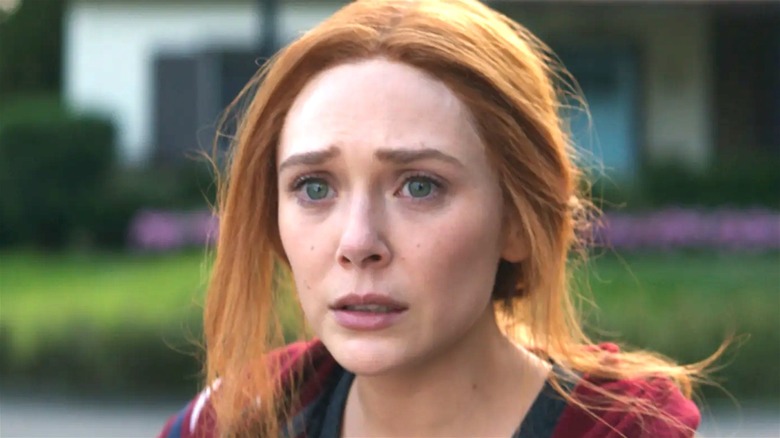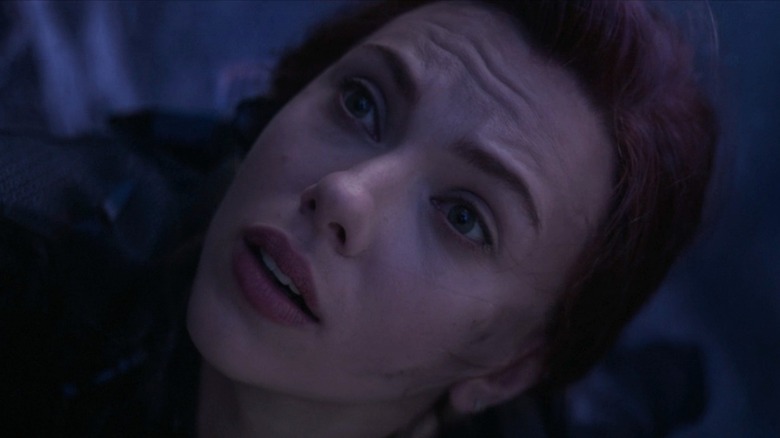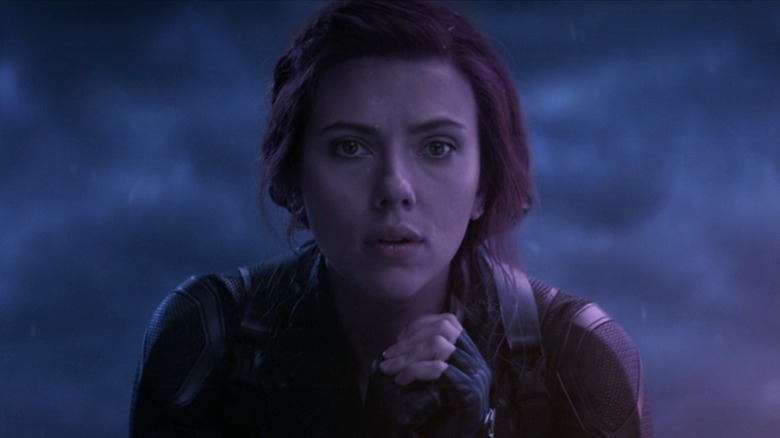Nearly 20% Of People Think This MCU Moment Went Too Far
The Marvel Cinematic Universe has taken over theaters since its 2008 debut with "Iron Man," and now it has done just the same with the small screen this year via three series (and counting) on Disney+. Marvel has grown a massive fan base of die-hard comics lovers and Avengers-newcomers alike, becoming a cultural mainstay and employer of nearly every actor in Hollywood.
But of course, even as the MCU breaks the box offices over and over again, there are some creative decisions made in the movies that people simply don't agree with. Of course, the films are decidedly PG-13 — with the exception of the upcoming "Deadpool 3" — to bring in as many kids, teens, and adults to the theaters as possible while keeping the thrilling action that characterizes superhero stories. So, the MCU isn't trying to gross anyone out or terrify its audiences with scenes that border on taboo. But that doesn't mean these movies lack moments that people think cross a line.
Looper conducted a survey of 630 people in the U.S., asking which moment across the 20+ movies in the MCU went too far. Here are the results.
Black Widow's death crossed the line
Coming in first was Black Widow's death in "Avengers: Endgame," with 19.52% of the votes. Just behind it were Agent Coulson's death in "Avengers" and Vision's death at the hands of Wanda in "Avengers: Infinity War." Evidently, fans aren't too fond of character deaths (but we already knew that from the eloquent billboard campaign to "bring back Tony Stark to life").
Truth be told, this isn't a very surprising result: Black Widow's death made countless fans angry, sparking criticism and two separate articles titled "How Avengers: Endgame failed Black Widow" by Vox and Vanity Fair. The other moments may have been sad and even resulted in entire series needed to unpack them, but none were as controversial as what befell Natasha Romanoff, aka Black Widow.
In "Endgame," Natasha (Scarlett Johansson) sacrifices herself as part of the Avengers' time heist to collect each of the Infinity Stones from the past and use them to bring back the half of the Universe that Thanos (Josh Brolin) snapped away. The obstacle is that the only way to get the Soul Stone is by sacrificing someone you love, so Clint Barton, aka Hawkeye (Jeremy Renner), and Natasha compete over who will die and who will live to bring the Stone back. Natasha argues that Clint should live because he has a wife and children to get back to, they physically fight it out, and she "wins" by flinging herself over the cliff. It's about two-thirds through the movie, when only the other original Avengers are alive to mourn her.
This plot point might not have been so bad in isolation, but the surrounding context is what really puts it in a bad light for many fans.
Overshadowed and questionable messaging
As the first and only female superhero for many years and many movies, Natasha wasn't given her own standalone story until after her in-universe death, in the form of the prequel film "Black Widow." So, naturally, a lot of the criticism of her character arc is informed by the context of her being the sole woman amidst so many men: She's been objectified and sidelined, relegated to a supporting position to the male superheroes.
It's important to note that Natasha isn't the only Avenger to permanently die in "Endgame." The franchise's first hero, Tony Stark, aka Iron Man (Robert Downey Jr.), passes in the climax of the film after defeating Thanos. Fans and critics were quick to point out that he got a lengthy funeral scene with nearly every hero in attendance, compared to the quiet, mid-film moment for Natasha. She's barely mentioned near the end, despite doing just as much to stop Thanos as Tony did.
In addition to that comparison, fans also have issues with how "Endgame" apparently values Clint more than Natasha because of his wife and children. This ties back to earlier criticism of Natasha's story in "Avengers: Age of Ultron" surrounding her infertility at the hands of her Soviet trainers: Dialogue in a scene between her and Bruce Banner (Mark Ruffalo) suggests this makes her a "monster."
Taken all together, many believe that Clint should have been the one to sacrifice himself for the Soul Stone. This was an option, Marvel creatives revealed to Empire Online, but it was passed over in favor of giving agency to Natasha's decision. "Endgame" co-writer Stephen McFeely said, "Our visual effects supervisor Jen Underdahl was reading [the version where Clint dies] going, 'Don't do that. Honor her choice.' And we took it very seriously. Many of the women on the crew were passionate about giving her the hero moment – don't take it away from her."
In another timeline, with a different story arc leading up to it, perhaps fans would have been more satisfied with her sacrifice. Maybe the upcoming "Black Widow" will change how people feel about it, as "Endgame" certainly informed Scarlett Johansson's performance.


